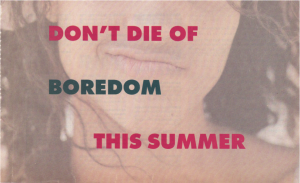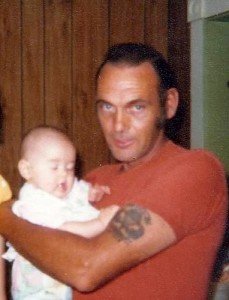In July of 1990, it was the summer before my sophomore year of high school.

Click to view a PDF scan of the July 1990 booklet in Sassy Magazine.
This is about women and music, but it also about how a girl can be put into the worst kinds of situations and locate some kind of joy, persist in the location of joy, for no other reason but to feel something good, as if feeling something good is the highest possible value, which in the summer of 1990, it was.
In July of 1990, Sassy magazine published an insert in the summer issue of the magazine—Don’t Die Of Boredom This Summer.
There were a lot of reasons I might have died growing up; it didn’t occur to me that boredom could be one of them.
I had a subscription to Sassy. I obtained it by taking a card from one of the magazines at the library, filling in the address of a friend, and folding cash into a sheet of legal paper. It took a little while to get the summer issue, because I wasn’t in school for a hand off, but when I did, I looked at the booklet first, fat and printed on newsprint, in the middle.
I remember so well the intensity of purpose and joy and just everything, everything I felt looking through it. It was a densely printed primer of all the music, movies, and books no one would ever tell a girl in 1990 to listen to, or watch, or see. It was an education in a shadow culture normally reserved for boys with elaborate stereo set-ups in the basement, for young men who went to places like Columbia and started bands or made movies or wrote novellas.
It had charts and icons. It had Eartha Kitt and RUN-DMC, The The, The Buzzcocks, and Sinead O’Connor. HAROLD AND MAUDE, MY LIFE AS A DOG, HEATHERS. TAR BABY, ‘SELINE, I’M WITH THE BAND.
It had a way out. Of something. I didn’t know how or why, but it felt like a ticket to something. It felt like access to a summer without hurt or fear, and I pried it out of the binding of the magazine and I fit it into my diary at the time, and for the first time, in a long while, I planned something.
Videos were hard for me. I could check some of the movies out at the library, but watching them in the environment of my home life was iffy, as were too many trips to friends’ houses. I made an entry in my diary with all of the movies in the booklet I wanted to see and a calendar for when I would watch them during my freshman year in college.
It was the very first time the idea of college wasn’t preceded by I wish, but instead, I will.
The books, yes. I remember feeling so proud that I had read about a third of them, already, like that proved there was something good inside of me. Which isn’t really what that means, I know, but I was fifteen. I was desperate. Books had already meant so much and had already put so much good in me, already.
What I wanted, what I wanted, more than anything, was the music. Already, I had persisted in a joy few supported me in, studying music and an instrument—I was one of those young children, who the first time they had access to music, to an instrument, just felt like something that had been missing was there, that it was a language that made sense above all things. I was greedy for the music in the booklet. Already, there had been those lunch tables at school, filled with smart boys, who somehow seemed to know everything about music and the albums that were important, and already, I had tried to join their conversations because I had heard at least some of what they talked about, and already, I had learned that what they were talking about wasn’t for me. Girls didn’t sit in beanbags in their basement and spend half the night with headphones dying over Nick Cave and the Bad Seeds.
Even if they had finally found a tape of Tender Prey and convinced a junior with a tape deck to let them sit in his car an hour before school and listen to it with the volume so high it felt like being inside of the music.
The entire time he accused me of saying I liked the music because I liked him.
I didn’t.
I didn’t have a set up in my basement. I did discover that my library had many of the more vintage albums, and a listening carrel, and that you could check out a tape recorder. I walked to the drugstore, where I could buy a slick pack of blank tapes, ridiculously expensive-seeming at the time, and I signed up for my forty-five minute block in the carrel with an Eartha Kitt album, the tape recorder, and my tapes and got maybe three songs in before the librarian caught me.
This was the hardest way to get music from the list, but I persisted. Sometimes I couldn’t record it, so I would just listen, moving the needle to play one track over and over and over, trying not to get angry, and then get kicked out, when the librarian would walk over to the carrel to turn down the volume on my headphones.
Then, I discovered that at 11 p.m. a college radio station had a request show, and I don’t think anyone listened to it, because when I would call in, whispering into the phone so no one would know I was using it, they always played four or five of the songs I wanted to hear from the list, and with a friend’s borrowed boom box and the blank tapes, I would record the songs.
I was able, too, to put together the money to buy three of the albums on the list (The Thes, another Nick Cave, REM), and borrow time with a few more of the albums from a cousin, and in this way, I made deep headway into the list that summer.
At the end of that summer, my grandmother died and was buried. I can’t say as much about that as I can say about the music I was listening to when she was dying. It was a summer of my usual suffering in a badly dysfunctional family, it was a summer where my grandmother died, and it was a summer that by the time I walked into the high school in September I was different, I felt different, I had some durable relationship to joy I hadn’t had before, some sense of my own womanhood.
That joy had done something to my fear, is what it was. It had taken apart some vital piece of it and replaced it with myself. Just me, not a reaction to me, or what was happening to me, or what others believed of me, or speculation of me, or my own hate of me, but me, just me, just me—some me who inside of a song played at high volume was recognizable to myself and also good and beautiful and who had choices and opinions that mattered.
What all of us need is more of those things that take apart fear, those things that when we persist in them, offer durable joy, those things that the more we work on them, the more joyful they become, and the less afraid and more like ourselves we feel.
I can’t . . . imagine that summer of mine, hardly at all, in a way. The hours I spent walking back and forth to the library, to a friend’s, to a faraway record store, on time that was limited and not my own. The ongoing grief of losing someone, the pain and fear of my home life, the work I did for a little money so I could listen to a new tape on a borrowed deck. In that way, I almost can’t imagine it, anymore.
Because what I remember is the music. What I remember is some new understanding of how life could be. What I remember, and what I can prove is a diary filled with less I wish and more I will. For the first time, a narrative of hope ran alongside a narrative of survival.
All of this is what I mean when I write about women and music. When I write about finding space as a women creator, when I write about writing, when I read a book I want everyone else to read, as if we’re all side-by-side sharing the same pair of headphones.
When I’ve written about this summer before, I’ve written about my relief that music and media is so much more accessible now. This quest I put in front of myself, that summer, isn’t a requirement for girls to find what they need. Except, I think I might have been wrong, because it wasn’t just the music that I found. I think it’s just as hard for a girl, for a woman, to find herself, and it doesn’t matter if a hundred songs can be downloaded in a few minutes or if you spend hours pushing pause/play to record from the radio. Women and girls are still hurt in their own homes, are still bound to litanies of IwishIwishIwish, still walk past tables full of boys and men with a sick feeling in their stomachs.
Too much questing and bravery is required to eliminate the unnecessary fear to engage with our own lives as ourselves. All of us should start with ourselves, and then only get bigger, take up more space, fall in love with more girls and women, feel free to do more and make more at the highest possible volume.
To persist in joy. To persist in it because it feels amazing. To be fearless, because when you are, you make things that contribute to your joy and the joy of others.
That’s what I hear in music. The fearlessness of making noise, of filling a space, of being heard. I hear the refrain of I will. I hear the sound of my own voice.
I hear the girl I always was.
This is part one of a short series I’m writing for Wonkomance on women and music, including women musicians.























